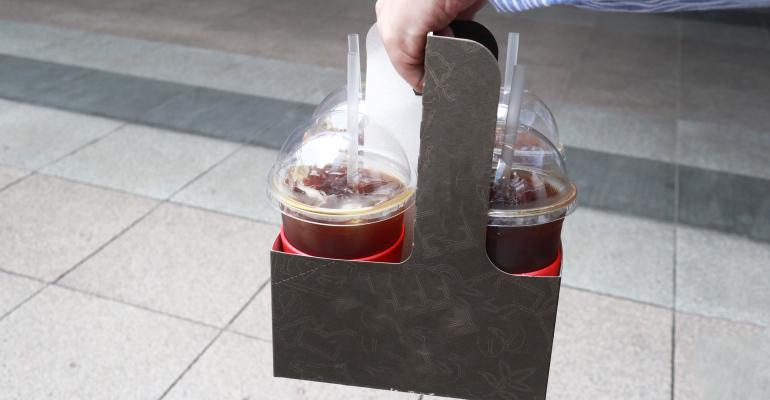Sponsored by Whirley-DrinkWorks!
With delivery, takeout and catering generating sizable new sales opportunities for restaurants, selling beverages to off-premise customers promises lucrative rewards. However, many agree that this growing business practice also presents challenges that need to be overcome.
One example of these challenges is the decision by consumers not to include beverages in their off-premise orders. Another is the insistence of some third-party delivery providers that they control beverage sales and profits. A third is the loss of brand marketing that occurs when orders go out without beverages. Finally, there is the urgent need for all operators in the off-premise game to use beverage packaging that is convenient, cost efficient and temperature conserving.
Those were some of the key issues raised in the annual Beverage Roundtable at the 2018 NRA Show in Chicago. The participants were executives of leading restaurant brands that offer off-premise service. The sponsor of the roundtable was Whirley-DrinkWorks!, a designer and manufacturer of custom LTO drinkware, cause marketing programs and off-premise drink bag solutions.
The off-premise beverage challenge
Although the actual size of third-party delivery orders tends to be larger than those of dine-in patrons, individual check averages typically are not. This is because off-premise customers with well-stocked home or workplace refrigerators may not feel the need to add beverages to their order.
However, there are actions operators can take to encourage off-premise customers to buy. “We go with very local beverages, something special that’s going to make the customer inclined to try something new or treat themselves — perhaps a bottled iced tea brand that’s popular in that area,” says Brian Farris, vice president of operations at Austin, Texas-based Schlotzsky’s.
Negotiating the beverage piece
Another potential hurdle in off-premise beverage service can occur when operators team up with third-party delivery providers who provide the beverages for delivery orders and reap these profits. “Those are big margins,” says Gracie Prasanson, director of sales at Beaumont, Texas-based Jason’s Deli. “You don’t want to give those away.”
Thus the control of beverage sales and profits in off-premise business partnerships is a key issue to negotiate. For Dallas-based Dickey’s Barbecue Restaurants, deciding who supplies bottled beverages for delivery orders has been a point of negotiation with certain third-party providers, notes Chief Executive Laura Rea Dickey. “I would just suggest you take a look at that if you’re exploring that avenue,” says Dickey.
On top of losing those valuable margins, operators may also miss sending brand messaging to consumers with off-premise orders. “For us, our big yellow beverage cup is so iconic that we’re looking not only for the margin in the beverage, but also to get a key marketing piece out,” says Dickey. “The way I look at it, the packaging becomes the brand. That’s why we put emphasis on communication and branding everything we can.”
Beverage packaging solutions
Participants also discussed the importance of packaging that keeps beverages at the proper temperature in delivery orders.
Packaging formats such as gallon-to-go drink bags for iced tea and carbonated beverages and insulated drink bags for hot beverages preserve temperature.
For example, the Whirley-DrinkWorks! Hot Drink Bag contains a thermal outer layer that holds hot beverages or soup for up to three hours. Also, the new Whirley Thermal Traveler Bag keeps ice, canned beverages or food hot or cold for up to three hours. In addition to holding temperature, collapsible drink bags are more space- and cost-efficient to use in a restaurant than bulky beverage containers.
Dallas-based Corner Bakery Cafe uses 1-gallon jugs for noncarbonated beverages and 1-gallon to-go boxes for hot coffee. However, Ed Keller, Corner Bakery’s director of off-premise business development, has reviewed drink bags as a solution that offers several operational advantages and retains the carbonation of bulk soda. “That’s a plus, and from a cost perspective it helps you a lot, so I’m a fan of those,” says Keller.
Jason’s Deli uses branded gallon jug containers and coffee boxes for bulk beverages as well as individual canned sodas, bottled waters and individual cups of iced tea. However, some beverage solutions need improvement, such as carriers for canned beverages and ice. “We’re always looking for a much better way to deliver that experience to the customer and the employees,” says Prasanson.
The payoff is substantial for operators who optimize the beverage piece in off-premise service. Promoting appealing beverages, negotiating effectively with third-party delivery partners and making smart packaging decisions are all keys to success in this fast-growing opportunity.




